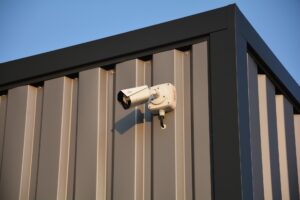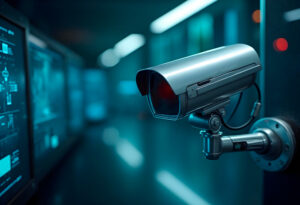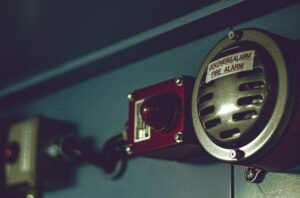Small businesses face various risks daily, from safeguarding employees and stock to securing their premises. This article shares ten practical security tips that can help businesses with a physical location reduce the risk of crime and lessen its impact if an incident occurs. For tailored advice on security for small businesses, contact our team today.
Key Takeaways:
- Security for small businesses is essential for protecting assets, data, and customers.
- Tailored security solutions help safeguard against potential threats like theft, cyberattacks, and unauthorised access.
- Small businesses need to implement a combination of physical security measures (e.g., CCTV, access control systems) and cybersecurity practices (e.g., firewalls, encryption).
- Regular security assessments ensure systems remain effective and up-to-date.
- Partnering with a professional security provider can save time, money, and prevent breaches.
Smart Security for Small Businesses: Strengthen Your Protection
Protecting your small business is more crucial than ever in today’s digital landscape. Smart security solutions offer advanced features that go beyond traditional systems, providing real-time monitoring, remote access, and AI-driven insights. These innovations help detect threats early, reduce response time, and safeguard valuable assets, both physical and digital. From intelligent video surveillance to secure access control, smart security systems are designed to scale with your business’s growth while keeping costs manageable. By integrating smart security, small business owners can have peace of mind, knowing they are protected from evolving threats without compromising their budget or operational efficiency.
Evaluate Your Risks
Risk is inevitable when running a business, regardless of your industry or location. Although some risks can’t be entirely prevented, there are ways to mitigate them. For example, while you can’t control someone’s intent to break in, you can install measures such as CCTV, security barriers, locks, and alarms to reduce the potential damage. Conducting a thorough risk assessment, including both physical and cybersecurity, is crucial. Identifying risks and implementing measures to manage them is key to maintaining security for small businesses. When was the last time you reviewed your risks?
Secure Your Boundaries
If your small business operates from a physical site, securing your perimeter is essential. A high-security fence can deter intruders, while automated gates and barriers can ensure only authorised personnel and vehicles access your premises. In addition to securing the boundary, it’s also important to reinforce the building’s entrances with sturdy locks and additional physical security measures, where necessary.
Learn more about Security Barriers and Gates.
Keep an Eye on Your Surroundings
CCTV is not only a tool for monitoring your premises round the clock but also serves as a strong deterrent against crime. Modern CCTV systems come with advanced features like night vision and high-quality image capture, all at a reasonable cost. Security for small businesses can greatly improve with professional CCTV installation. The presence of CCTV, along with barking dogs, is often enough to deter potential burglars. Additionally, police often cite the absence of CCTV evidence as a reason criminals avoid capture. For peace of mind, consider installing a CCTV system that is professionally set up.
Safeguard Your Assets
Where do you store your valuable items? Are they secured in a locked safe or left vulnerable in an unlocked drawer? Both staff and business owners sometimes overlook asset protection, often due to complacency. The ‘it won’t happen to us’ mindset is common, especially among those who haven’t experienced theft or crime. However, this attitude can lead to costly consequences. For enhanced security for small businesses, we recommend locking valuables in a secure location or, where possible, keeping them offsite. Avoiding cash on-site is a common practice for safeguarding physical assets.
Learn more about Intruder Alarms.
Install an Intruder Alarm
An intruder alarm can significantly reduce the time an unauthorised person spends on your property while also alerting nearby people and authorities. According to surveys, 60% of convicted burglars admit to being discouraged by the presence of an alarm system. This simple yet effective security measure is essential for protecting your premises.
Fire Safety Measures
Fire alarms are a must-have for all businesses. They provide a cost-effective, safe, and reliable way to protect your staff in case of fire. The responsibility for fire safety typically falls to the employer, property owner, or anyone else in control of the premises, such as a facilities manager. In addition to installing fire alarms, businesses must conduct fire risk assessments, inform staff of potential hazards, and ensure safety measures are in place.
“You’re responsible for fire safety in business or other non-domestic premises if you’re:
- an employer
- the owner
- the landlord
- an occupier
- anyone else with control of the premises, for example a facilities manager, building manager, managing agent or risk assessor
- You’re known as the ‘responsible person’. If there’s more than one responsible person, you have to work together to meet your responsibilities.
- The Fire Safety Order also applies if you have paying guests, for example if you run a bed and breakfast, guesthouse or let a self-catering property. Fire safety rules are different in Scotland and Northern Ireland.
As the responsible person you must:
- carry out a fire risk assessment of the premises and review it regularly
- tell staff or their representatives about the risks you’ve identified
- put in place, and maintain, appropriate fire safety measures
- plan for an emergency
- provide staff information, fire safety instruction and training”
It is also important to note, “you could be fined or go to prison if you do not follow fire safety regulations.”
Manage Access
Access control systems limit who can enter specific areas of your building. These systems use fobs or cards, which can be programmed to grant access only to authorised individuals. While access control may not be necessary for very small businesses, it is a vital security measure for larger sites such as schools, hospitals, and government buildings.
Learn more about Access Control.
Cybersecurity Awareness
Cyber threats are just as significant as physical security risks for modern businesses. If your online data is compromised, the impact on your business, employees, and customers could be severe. Even though our focus is on physical security, there are several key cybersecurity steps that businesses can take: use strong passwords, enable two-factor authentication, securely store sensitive data, and educate your staff on cyber safety practices. Cybersecurity is a crucial element of security for small businesses that shouldn’t be overlooked.
Cyber risks are a modern-day security threat that can impact all aspects of your business operation. If your online data were compromised, this would significantly impact not only you, but also your clients and staff. While our specialisation is physical security, here are some general cyber security tips to help your small business:
- Use strong passwords and a password management system
- Use two-factor or multi-factor authentication
- Securely store client and personal data
- Do not give credit card or confidential details if you’re unsure
- Beware of scams
- Educate staff about cyber safety
- Keep your software up to date
- Be careful what you click
- Install recognised antivirus/anti-malware protection
Security Procedures
Small business owners often think that risk management or security procedures are only relevant to big corporations. This is incorrect. Disasters, security breaches, and crime can happen to anyone. Knowing what to do in an emergency can serve you well during an emergency event. Would you know what to do in the event of a fire, lockdown, or evacuation? And would your staff know how to act? No matter the size of your business, it is important to invest time in creating emergency procedures.
Establish Security Protocols
It’s a common misconception that small businesses don’t need to worry about security protocols or risk management, assuming that only large companies are at risk. This couldn’t be further from the truth. In reality, incidents such as security breaches or emergencies can happen to anyone. Would your staff know what to do in the event of a fire, break-in, or other emergency? Establishing security procedures and ensuring all employees are trained in them is vital.
Review Your Insurance Coverage
Risk management goes beyond prevention; it also includes preparation for recovery. Insurance is a critical tool for protecting your business in case something goes wrong. However, it’s essential to understand exactly what your policy covers and any limitations that could affect your ability to make a claim. Reviewing your insurance regularly ensures you’re fully covered against potential risks.
Implement Security Solutions
If this article has prompted you to reconsider your business’s security measures, now is the time to take action. Reach out to us today to learn how we can assist with installing CCTV, fire alarms, access control, and other security solutions. We offer comprehensive services, including installation, maintenance, and repairs, ensuring the highest level of security for small businesses.
CONTACT US CALL NOW
|
Inquire About Our Flexible Payment Plans If you’re interested, be sure to ask about our flexible payment plans and favourable payment terms available for major security installations. |
Special Offer on Security Maintenance Receive a FREE initial site visit when you enrol in our 12-month maintenance plan! Find out more in our latest article on security maintenance. |
Protecting your business is crucial, and with the right security measures, you can focus on growth without worry. At AI-Security, we specialise in providing security for small businesses. Whether you need CCTV installation, access control, or cybersecurity services, we’ve got you covered. Contact us today at Vigilant House, 1155 London Road, Leigh-on-Sea, SS9 3JE, or call 01702 476 700 to schedule a consultation and learn how we can tailor a security solution to fit your needs. Your business deserves the best protection—don’t wait until it’s too late!
Conclusion
Ensuring robust security for small businesses is not just a necessity but a smart investment. By protecting your assets, employees, and customer data, you safeguard the future growth and success of your business. Don’t wait until an incident occurs—take proactive measures to enhance your security today. Are you ready to take the next step in securing your small business? Reach out to a professional to explore tailored security solutions that fit your needs and keep your business protected.
FAQs:
Q: Why is security important for small businesses?
A: Small businesses are often targeted by criminals due to perceived vulnerabilities. Effective security measures protect valuable assets, sensitive information, and prevent financial losses.
Q: What types of security should small businesses implement?
A: Small businesses should invest in both physical security (such as cameras, alarms, and access controls) and cybersecurity (like firewalls, data encryption, and antivirus software).
Q: How can security providers help small businesses?
A: Security providers offer tailored solutions, conduct assessments, install necessary systems, and monitor for potential threats, giving business owners peace of mind.
Q: How often should small businesses review their security measures?
A: It’s recommended to review and update security systems at least annually or after any significant changes in the business operations to ensure effectiveness.












